|
|
|
Sort Order |
|
|
|
Items / Page
|
|
|
|
|
|
|
| Srl | Item |
| 1 |
ID:
066839
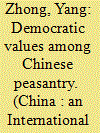

|
|
|
| 2 |
ID:
144566


|
|
|
|
|
| Summary/Abstract |
Employing national identity theories and survey data in Taiwan, this article explains national identity shift in Taiwan. Descriptively we find that most Taiwanese people reject being called ‘Chinese’ (zhongguoren) when asked about their national identity. However, they do not deny their ethnic and cultural Chinese identity. What they object to is being called Chinese nationals, especially this China which is internationally recognized as the People’s Republic of China. In other words, most Taiwanese people do not identify themselves with the mainland Chinese state even though they still associate themselves with the Chinese nation. It is also noted that there is no consensus with regard to national identity in Taiwan, since close to one third of the population still do not object to be called zhongguoren. The author’s analytical findings further confirm that external sovereignty-related factors are related to the Taiwanese national identity shift. Specifically, a changed state boundary, separation desire from mainland China, and recognition of Taiwan as a sovereign state, not the distinctive cultural reconstruction inside Taiwan, contribute to the national identity shift in Taiwan.
|
|
|
|
|
|
|
|
|
|
|
|
|
|
|
|
| 3 |
ID:
092163


|
|
|
|
|
| Publication |
2009.
|
| Summary/Abstract |
This article examines changes in China's welfare programs in the context of economic transition from planned economy to a market-oriented economy. Using the 1988 and 1995 Chinese Household Income Project (CHIP), we develop analytical models to study the critical impacts of institutional variables such as economic ownership types and economic sectors on key welfare programs in both rural and urban areas in China. Our findings show that the Chinese government drastically reduced welfare coverage for its citizens during the economic transitional period even though Chinese urban residents' welfare income was primarily determined by the type of their employment. Outperforming many other factors, work unit's ownership nature played a significant role in the provision of welfare benefits while the economic sectors largely failed to have any significant impacts. These findings indicate that China has been moving away from the active state model in welfare provision. Yet, an industrialization and resource-based welfare system has not been realized in China in the reform era.
|
|
|
|
|
|
|
|
|
|
|
|
|
|
|
|
| 4 |
ID:
060207


|
|
|
|
|
| Publication |
New York, Palgrave Macmillan, 2005.
|
| Description |
ix, 209p.
|
| Standard Number |
1403967342
|
|
|
|
|
|
|
|
|
|
|
|
Copies: C:1/I:0,R:0,Q:0
Circulation
| Accession# | Call# | Current Location | Status | Policy | Location |
| 049431 | 320.951/CHE 049431 | Main | On Shelf | General | |
|
|
|
|
| 5 |
ID:
071918
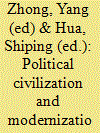

|
|
|
|
|
| Publication |
New Jersey, World Scientific Publishing Co., 2006.
|
| Description |
xii, 330p.
|
| Series |
Series on Contemporary China Vol 4
|
| Standard Number |
9812565027
|
|
|
|
|
|
|
|
|
|
|
|
Copies: C:1/I:0,R:0,Q:0
Circulation
| Accession# | Call# | Current Location | Status | Policy | Location |
| 051262 | 306.20951/ZHO 051262 | Main | On Shelf | General | |
|
|
|
|
| 6 |
ID:
143781


|
|
|
|
|
| Summary/Abstract |
Street protests have become commonplace in China. Utilizing extensive survey data, this study attempts to shed light on the nature of environmental street protests in China. The key question to be answered in the article is: why, facing the same issue, do some people choose the option of participating in street protests while others do not? Multivariate analytical findings indicate that Chinese urban residents’ willingness to participate in street protests over a hypothetical pollution issue in China is significantly related to their attitudes toward institutions in China. What motivates people to participate in street protests has a lot to do with their trust and support of the political system in China and their perceived government transparency. In other words, these protests are not just what Lewis Coser calls ‘realistic conflicts’ which primarily involve specific issues and solutions. One implication from this study is that street protests in China may not be as benign and non-regime threatening as some scholars might think.
|
|
|
|
|
|
|
|
|
|
|
|
|
|
|
|
| 7 |
ID:
120403
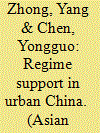

|
|
|
|
|
| Publication |
2013.
|
| Summary/Abstract |
Why has the Chinese regime been resilient in the most populous country in the world? Based on survey data collected from five large Chinese cities, this study finds that a majority of Chinese urban residents show a certain degree of support for the current political regime and do not favor fundamental regime change. This diffuse regime support is largely determined by satisfaction with government performance in a number of policy areas that affect people's daily lives.
|
|
|
|
|
|
|
|
|
|
|
|
|
|
|
|
| 8 |
ID:
095476
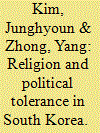

|
|
|
|
|
| Publication |
2010.
|
| Summary/Abstract |
This paper examines the relationship between individuals' religiosity and its impact on political tolerance in South Korea. Based on the results of survey data analysis, we find that there are inter-denominational as well as intra-denominational differences of religiosity that influence levels of political tolerance among South Koreans. In terms of the inter-denominational differences (the ethnoreligious thesis), we find that Buddhists tend to be more tolerant than Protestants, and Protestants tend to have the lowest level of political tolerance in South Korea. In terms of the intra-denominational differences (the culture wars thesis), religious traditionalists have a lower level of political tolerance than religious modernists in South Korea. This paper argues that there is a statistically significant relationship between individuals' religiosity and their level of political tolerance, and that a composite model (combining the ethno-religious model and the culture wars model) is the best way of investigating such a relationship in the Korean context.
|
|
|
|
|
|
|
|
|
|
|
|
|
|
|
|
| 9 |
ID:
173935
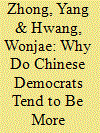

|
|
|
|
|
| Summary/Abstract |
Popular nationalism remains strong in China. What drives this strong nationalistic sentiment? This is the key question this study attempts to answer. The authors are particularly interested in the connection between domestic politics and outward nationalist feelings among Chinese urban residents, specifically the relationship between democratic orientation and regime support on the one hand and nationalist feelings on the other. Descriptive findings from random survey data on Chinese urban residents in 34 Chinese cities reveal that democracy-oriented Chinese urbanites tend to show stronger nationalistic feelings. A large volume of literature on the relationship between democratic value and nationalistic sentiments, however, generally suggests that people with more liberal democratic values tend to be less nationalistic. How should one, then, reconcile and explain this seemingly contradictory relationship in China? Upon further research, the study finds that system support is a confounding factor affecting Chinese urban residents’ nationalistic sentiments. People with more nationalistic feelings tend to be those who show less support for the current system in China. Popular political discontent with the Chinese domestic system may very well have a spill-over effect on Chinese people’s nationalist feelings toward the outside world.
|
|
|
|
|
|
|
|
|
|
|
|
|
|
|
|
|
|
|
|
|